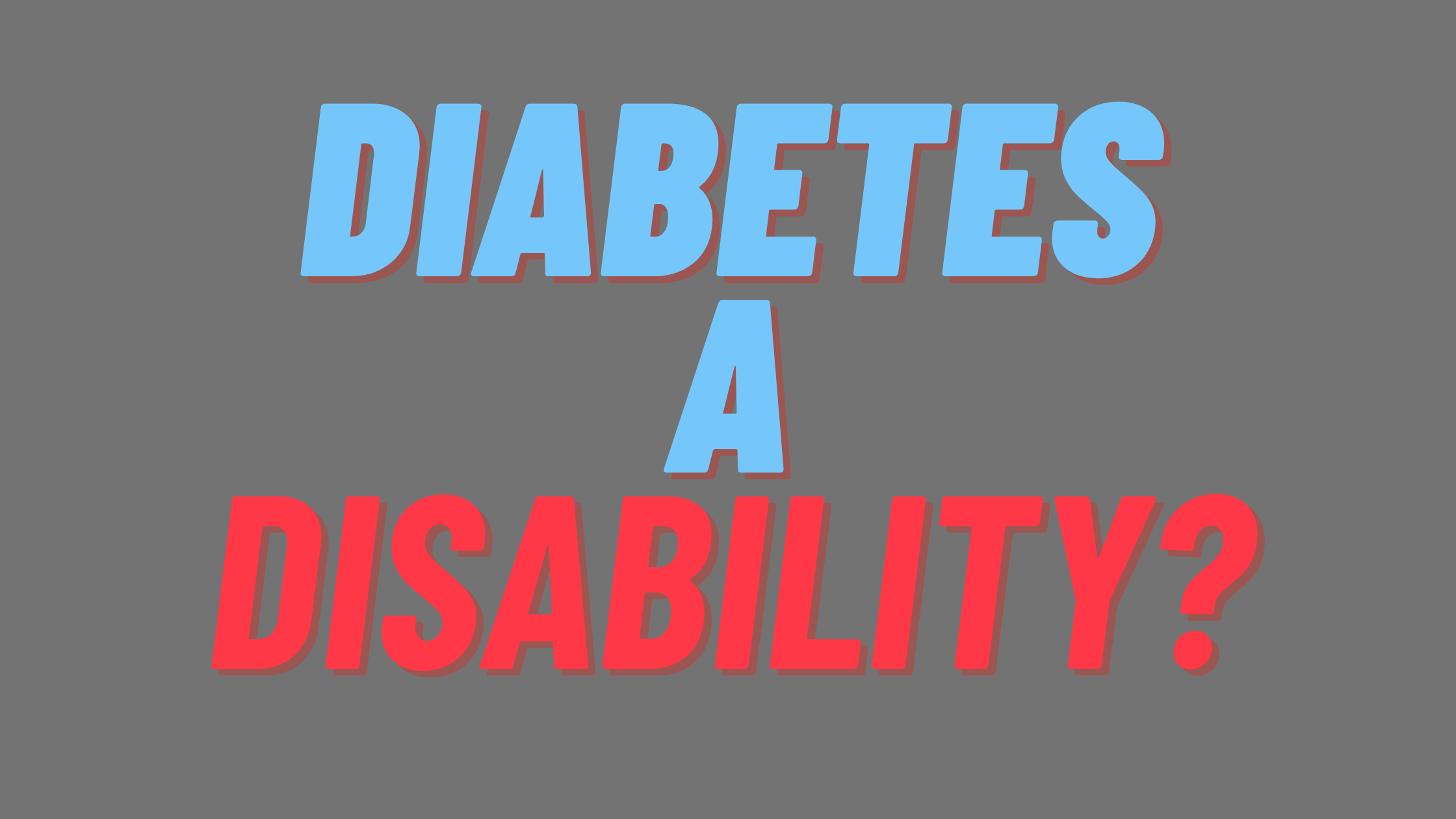Introduction
When confronted with the question, “Is diabetes a disability?” we embark on a journey that intertwines medical understanding, legal considerations, and deeply personal experiences. As someone living with diabetes, I have navigated the nuances of this condition, experiencing firsthand how it impacts everyday life and challenges our perceptions of disability.
Diabetes, often seen just as a chronic medical condition, carries implications that extend far beyond regular health management. It touches upon legal rights, societal understanding, and personal identity. This exploration seeks to unravel the complexities of diabetes as a potential disability, examining it through various lenses to offer a comprehensive view.

From the medical intricacies of managing blood sugar to the legalities of disability recognition, and the real-life stories of those affected, we aim to shed light on this multifaceted issue. Join me in delving into the world of diabetes, where every story, statistic, and medical fact contributes to a broader understanding of what it means to live with this condition and whether it qualifies as a disability.
Understanding Diabetes
As someone who has navigated the complexities of living with diabetes, I’ve gained a deep understanding of this condition, often mired in misconceptions and oversimplifications. The question, “Is diabetes a disability?” is not only a medical or legal inquiry but also a deeply personal one for many, including myself.
Diabetes at a Glance
First, let’s demystify diabetes. Diabetes is a chronic health condition where the body struggles to manage blood sugar levels. It’s primarily categorized into two types: Type 1, an autoimmune condition where the body doesn’t produce insulin, and Type 2, where the body doesn’t use insulin effectively. There’s also Gestational Diabetes, which occurs during pregnancy.
Each type presents unique challenges, but they share common threads in how they impact daily life. From strict diet management to constant blood sugar monitoring and dealing with potential complications, diabetes is a relentless balancing act.
Diabetes and Disability: A Personal Perspective
In my experience, the query “is diabetes a disability?” often evokes a spectrum of emotions and opinions. Legally, a disability is a physical or mental condition that substantially limits one or more major life activities. For many living with diabetes, this definition resonates deeply. The constant monitoring of blood sugar, planning around meals and activities, and managing the risk of serious complications like hypoglycemia or diabetic ketoacidosis are more than mere inconveniences; they are significant life-altering challenges.
However, the notion of diabetes as a disability isn’t universally accepted or understood. This lack of consensus is not just a matter of semantics; it influences public policy, workplace accommodations, and societal attitudes towards those with diabetes.
Personal Reflections on the Impact of Diabetes
Reflecting on my journey, I’ve come to realize that diabetes, in many ways, fits the criteria of a disability. It requires meticulous management and adaptation to a lifestyle that can be demanding and unforgiving. Yet, the resilience and determination I’ve witnessed in the diabetes community are nothing short of inspiring.
In my view, recognizing diabetes as a disability isn’t about labeling or limiting what individuals with diabetes can achieve. Instead, it’s about acknowledging the challenges we face and ensuring the necessary support and accommodations are available.
As we delve deeper into this topic, it’s crucial to remember that the debate over whether diabetes is a disability extends beyond legal definitions and medical classifications. It’s about the lived experiences of millions of individuals who navigate this condition every day. It’s about understanding, empathy, and advocacy for a community that strives for normalcy amidst a life-altering condition.
Diabetes Under the Lens of Disability Law
Understanding the Legal Framework
Disability law, especially in countries like the United States, is governed by statutes like the Americans with Disabilities Act (ADA). Under these laws, a disability is defined as a physical or mental impairment that substantially limits one or more major life activities. This definition is crucial as it determines who is protected under the law and entitled to reasonable accommodations, either in the workplace or in public spaces.
Diabetes: A Case for Disability
In my journey, understanding how diabetes fits into this legal framework has been enlightening. Diabetes, by its nature, requires constant and vigilant management of blood sugar levels. This ongoing management process, which often includes regular insulin injections or the use of an insulin pump, dietary restrictions, and continuous monitoring, can be seen as a substantial limitation on major life activities, such as eating, working, and even thinking clearly (especially during episodes of hyperglycemia or hypoglycemia).
Personal Insights on Diabetes and Disability Law
From my perspective, categorizing diabetes as a disability under the law is not just a label; it’s a necessary recognition that can provide essential protections and accommodations. For instance, in the workplace, this recognition can translate into necessary breaks for blood sugar management or a private space for insulin administration.
However, there’s often a gap between legal theory and real-life practice. While the law may recognize diabetes as a disability, there’s still a need for greater awareness and understanding among employers and the public about what this means and how to implement it effectively.
Navigating the Legal Landscape
Navigating the legal landscape as a person with diabetes can be daunting. I’ve experienced firsthand the challenges of advocating for my rights under disability law. It requires not only a deep understanding of the law but also the courage to speak up for necessary accommodations, often in the face of misunderstanding or ignorance.
Reflecting on the Journey
In reflecting on my journey, I’ve come to appreciate the importance of disability law in providing a framework for protection and accommodation. However, I’ve also realized that laws are only as effective as their implementation and the public’s understanding of them. The question, “Is diabetes a disability?” is not just legal; it’s a call for a broader dialogue about how we, as a society, support individuals living with chronic conditions.
Medical Perspective on Diabetes as a Disability
The Complexities of Diabetes
Diabetes is a complex endocrine disorder characterized by the body’s inability to regulate blood sugar levels properly. Whether it’s Type 1, where the pancreas produces little to no insulin, or Type 2, where the body fails to use insulin correctly, both types entail a rigorous and often exhausting daily management routine.
Medical Definition of Disability
In medical terms, a disability is any condition that impairs normal activities of daily living. From my interactions with healthcare professionals, it’s clear that diabetes can be debilitating. The constant vigilance required to manage blood sugar levels, coupled with the potential for severe complications such as neuropathy, kidney failure, or cardiovascular diseases, aligns closely with this definition.

Personal Experiences in the Medical Context
Reflecting on my personal experiences, I’ve often felt that the medical perspective on whether “diabetes is a disability” is intrinsically linked to the severity and impact of the condition on an individual’s life. While some people with diabetes might manage their condition with minimal disruption to their daily lives, others may face significant challenges that impair their normal functioning.
Healthcare Interactions and Perceptions
Interactions with various healthcare providers have shown me that the medical community generally acknowledges the disabling potential of diabetes. This recognition is crucial as it informs treatment plans, patient education, and support strategies. However, there’s a noticeable variance in how different health professionals perceive and address the ‘disability’ aspect of diabetes, often influenced by their specialties and experiences.
Navigating Diabetes as a Patient
Navigating diabetes from a patient’s perspective involves more than just managing blood sugar levels; it’s about dealing with a condition that can be invisibly debilitating. Advocating for oneself in medical settings often requires explaining the less visible aspects of diabetes, such as fatigue, mental health issues, and how fluctuating blood sugars can affect cognitive and physical abilities.
Personal Stories and Case Studies
Diabetes, though a common label, manifests uniquely in each individual. Some manage it with minimal lifestyle adjustments, while others face significant challenges that can be disabling. For instance, a friend of mine, also living with Type 1 diabetes, has had to navigate severe hypoglycemic episodes, leading to hospitalizations and impacting her ability to work consistently. Such experiences compellingly argue that for many, diabetes does align with the concept of a disability.

Case Studies: Real-Life Impacts
In various case studies I’ve come across, the disabling aspects of diabetes are clear. One study highlighted a professional whose job performance was severely impacted due to fluctuating blood sugar levels, leading to cognitive impairment. Another case involved a young athlete struggling to balance her sporting ambitions with rigorous diabetes management. These stories underscore the reality that for many, the question “Is diabetes a disability?” is not hypothetical but a daily-lived experience.
Personal Reflections on Living with Diabetes
Reflecting on my own journey, I’ve had days where managing diabetes felt like a full-time job. Balancing work, social engagements, and health can be overwhelming, especially when unexpected blood sugar fluctuations occur. It’s a constant learning process, and each day brings its own set of challenges.
Learning from Others
Engaging with the diabetes community, through support groups and online forums, has shown me the vast spectrum of how diabetes affects individuals. Some share stories of resilience and triumph, while others express frustration over the limitations they face. These stories are a testament to the fact that while diabetes may not universally be considered a disability, it certainly has the potential to be disabling in many cases.

Insights Gained
These personal stories and case studies reveal a critical aspect of the debate over whether “diabetes is a disability.” They highlight the importance of viewing diabetes not just through a medical or legal lens but through the lens of those who live with it every day. Each narrative adds a layer of understanding to what it means to live with diabetes and challenges us to consider the broader implications of classifying it as a disability.
Conclusion: is diabetes a disability?
In exploring the multifaceted question, “Is diabetes a disability?” through various lenses – medical, legal, and personal – we uncover a complex and nuanced landscape. As someone living with diabetes, my journey has been both challenging and enlightening, revealing the diverse ways this condition impacts individuals’ lives.
Diabetes can be much more than a medical condition; for many, it’s a daily battle that intersects with legal definitions, healthcare systems, and personal resilience. The stories and case studies we’ve delved into highlight the real-life implications of diabetes, showing that for some, it aligns with the concept of disability, bringing significant life changes and requiring adaptations.
Ultimately, whether diabetes is considered a disability may vary based on individual circumstances and perspectives. However, it’s clear that this conversation is crucial in fostering greater understanding, support, and advocacy for those living with diabetes. By acknowledging the challenges and embracing the strengths within the diabetes community, we can move towards a more inclusive and empathetic society.
This journey through the different facets of diabetes has reinforced the importance of viewing each individual’s experience with empathy and understanding, recognizing the unique challenges they face in their daily lives.




